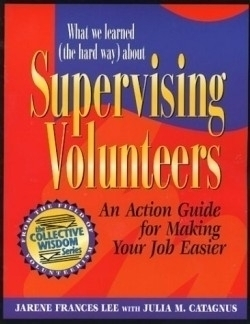
What We Learned (the Hard Way) about Supervising Volunteers
An Action Guide for making Your Job Easier
Anyone who’s ever supervised volunteers knows the sinking feeling when faced with one who just isn’t making the grade. How do you “fire” someone who is working without pay? This is just one of the often tricky issues facing volunteer supervisors everywhere tackled with understanding and wisdom in What We Learned The Hard Way about Supervising Volunteers. The first in “The Collective Wisdom Series” planned by Energize, Inc. it is a practical, well-organized handbook compiled from an impressive array of resources.
Primary author Lee has written an insider’s knowledgeable text drawing from her own seventeen years of experience in the field as director of the department of Volunteer Resources at Memorial Sloan-Kettering Cancer Center in New York City. Ten pertinent chapters detail the responsibilities of a supervisor, help define expectations of volunteers, develop performance appraisals, share ideas on providing effective, continuous recognition and encouragement, deal with performance problems and adjust one’s supervisory style to the situation and volunteers and more.
Additionally, easy-reference sidebars supplement the majority of pages with timeless excerpts from articles written by experts from all over the world. A bibliography provides information for further reading of the archival material. Other sidebars, “from the field,” are letters from the day-to-day experts—supervisors and volunteers from programs all across the country—Big Brothers/Big Sisters, HIV/AIDS programs, libraries, churches, foster grandparents and the like. These letters share specific situations: how one supervisor handled a church volunteer who was not doing an adequate job; how another used Captain Kirk from Star Trek fame as her model for effective leadership. Quotes from participants of focus groups held by the book collaborators further round out the text.
But the editors do not stop there. Addressing the limited time most supervisors have to reinvent the wheel, practical forms are provided too: examples of standard operating procedures, evaluation forms, volunteer self-evaluation forms and more. About the only criticism of the volume is that it is so chockfull of good information the editors could have gone even further highlighting special points in standout text. All in all, however, they have done a commendable job organizing a detailed and useful book with principles those supervising paid employees would do well to consider as well.
Disclosure: This article is not an endorsement, but a review. The publisher of this book provided free copies of the book to have their book reviewed by a professional reviewer. No fee was paid by the publisher for this review. Foreword Reviews only recommends books that we love. Foreword Magazine, Inc. is disclosing this in accordance with the Federal Trade Commission’s 16 CFR, Part 255.
